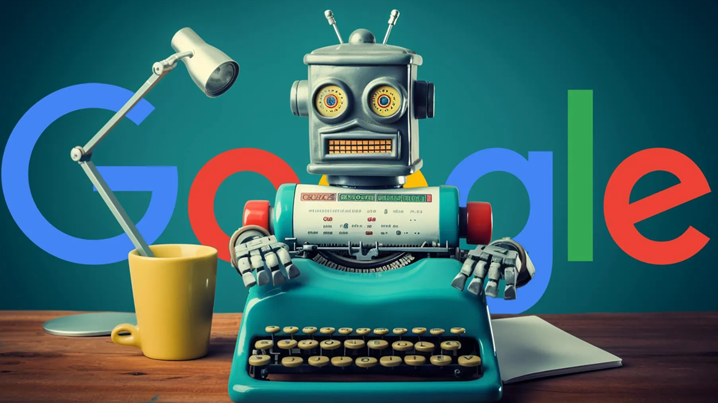We have now reached a point where the majority of business owners are not only familiar with AI writing tools like ChatGPT and Bard but have also dabbled in using them for content creation. And on the surface level, why not? Automating content production can lead to substantial cost savings and a rapid output of content.
But with Google’s recent policy update (August 01, 2023), it’s now essential for business owners to have a much deeper understanding of the implications AI-generated content has on search engine rankings and other key metrics.
Until this latest policy announcement, Google had adopted a fairly neutral position toward AI-generated content and maintained that using such tools was ok provided the output was of value to readers and not solely focused on getting ahead in search engine rankings.
That stance appears to be wavering though, as the recent update shows. It’s been made perfectly clear that AI-generated content that seeks to manipulate search engine algorithms or deceive consumers will be treated as a violation of Google’s webmaster policies.
In other words, if you’re going to use AI writing tools for content production, you need to make sure that it contributes positively to the consumer experience and also comply with all of Google’s guidelines.
Here’s what was said by Google…
Google’s recently updated merchant centre policy states this about AI-generated content
Automated Content: We don’t allow reviews that are primarily generated by an automated program or artificial intelligence application.
If you have identified such content, it should be marked as spam in your feed using the <is_spam> attribute.
We’re also providing more guidance on how we enforce our policies:
- We use a combination of automated and human evaluation to ensure that content and reviews comply with our policies. Our enforcement technologies use machine learning algorithms to help protect our merchants and users by keeping our shopping platforms safe. More complex, nuanced or severe cases are reviewed and evaluated by our specially trained experts, who conduct content evaluations that might be difficult for algorithms to perform alone, for example, because an understanding of the context of the piece of content is required.
- We take action on content and reviews that violate our policies. This may include disapproving the violating content or a violating review, as well as issuing warnings or suspending accounts for repeated or egregious violations. We take repeat violations of our policies seriously.
And fair enough too. When genuine consumers seek reviews on products or services to make informed purchasing decisions, they don’t want to be misled or deceived. And nor should they be.
The problems with content created solely by AI
While A tools are undeniably impressive, they are not without their flaws. It’s important to remember that the output of any AI platform can only be derived from the input received, and quite simply and bluntly put, it’s a case of “crap in….. crap out.”
But more than that, these tools operate on a predictive language model, meaning they generate a response to the input request that is based on what they statistically think will be the most suitable answer. This isn’t always accurate or relevant, and often it’s lacking in contextual awareness and any sense of human sentiment.
Accordingly, it’s impossible to guarantee that everything an AI system produces is 100% accurate and as such, unchecked AI content can potentially be seen as misleading, deceptive or even dangerous by Google. And in fields like law and healthcare, the consequences of publishing inaccurate content could be absolutely disastrous.
The importance of human input remains critical
The only way to truly ensure that content remains accurate, contextually relevant, engaging, and original is to involve the human touch. While AI platforms have their place as a tool in the content creation process, the need for human review is unquestionable.
My thoughts on Google’s next move…
While search engines state there are no current concerns with AI-generated content, I believe they will move to exert tighter control over its usage, particularly when it comes to search results.
For instance, I highly doubt Google will be inclined to present content on subjects such as finance, health and legal matters high in the search results if it were fully AI-generated and, therefore, subject to potential inaccuracies. The chance of actual harm resulting from incorrect information on these topics is genuine, and Google is unlikely to leave itself in a position for possible litigation.
As to how this might be managed, it’s very much a case of ‘watch this space’.
So, what does this mean for business owners?
Firstly, it’s essential to understand that Google is not (at this stage) banning AI-generated content outright — this would obviously create a massive disruption in the SEO and digital marketing industries.
But what Google does expect from business owners is for any software used to produce content to generate something that adds to the user experience and isn’t merely an attempt to manipulate search engine algorithms or deceive readers. If you are publishing high-quality, valuable content then you should expect to continue as normal without issue.
The key takeaway for AI users
If you are using AI tools to create content for your business, then it’s essential to have a human review of it. Adding a human touch ensures accuracy and maximises the value your content brings to others. You should also ensure any generated output is consistent with your brand and supports your long-term content goals.
As AI writing tools continue to grow in popularity and the uptake of their use grows, I believe businesses that publish human-generated content will fare well and be rewarded in search engine results. Why? Because the unique perspective, creativity and empathy a human writer provides are qualities that an AI, no matter how advanced, simply cannot replicate. This is the essence of content that connects, engages and ultimately, drives action. So, while AI may be an effective tool for boosting productivity and efficiency, at the end of the day, it is the human touch that defines authentic and impactful communication.



